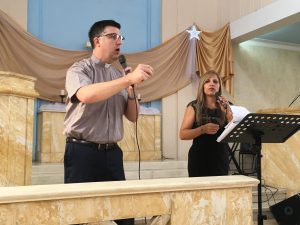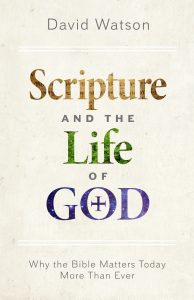
Dr. David Watson preaches in Vedado Methodist Church in Havana, Cuba, as Aylen Font Marrero translates the message. Photo by Steve Beard.
By Chris Ritter-
If there is a spiritual awakening waiting for the United Methodist Church, an essential ingredient of that renewal will be reclamation of Scripture as divinely inspired and authoritative. But there is more. John Wesley was clear that holding right opinions about the Bible and Christianity is not enough. In his sermon, “The Way to the Kingdom,” Wesley wrote: “A man may be as orthodox as the devil … and all the while be as great a stranger to the religion of the heart.”
We who seek the recovery of classic Methodism too often focus on the first half of the equation and not enough on the heart. Being the academic dean of a major United Methodist seminary, we might cynically expect Dr. David Watson to be of little help on either score. But there is ample evidence to the contrary. The latest is Scripture and the Life of God: Why the Bible Matters Today More Than Ever, his recent work offered by Seedbed.
We needed this book. When major evangelicals leave an orthodox understanding of the faith, they often write something explaining why they are really “still in” in all the ways that matter. These publications invariably end up being about the Bible, tenderly highlighting its supposed inadequacies like a pet owner might speak of their ugly, misbehaving dog: “We love it anyway and wouldn’t trade it for anything.” So we have this growing library of recent works describing the ways in which the Bible is inadequate for moral decision-making today. It is easy to lose sight of the fact that we are the ones who desperately need critiquing. While not making this the sole focus of his book, Watson offers a clear response to the claims of these authors.
He does so by reclaiming the Bible as scripture. Not merely a collection of ancient writings to be studied and debated, Scripture is an instrument God uses to communicate to those he loves. Watson does not abandon critical biblical scholarship, but neither does he treat it as an end in itself. The purpose of the Bible is nothing other than our salvation. He is very helpful in Chapter Two describing how this process works.
As I write, there is a growing list of notable figures being exposed publicly for how they have exposed themselves privately. Hollywood is in crisis as it feeds the very culture of exploitation it wants to stop. Our political leaders are just as guilty and just as helpless. Being an institution involving humanity, the Church is in no way immune. But Watson reminds us that we hold the medicine in our hands. We have something to offer the bruised and battered refugees from the sexual revolution: “God is the great physician, we are the patients, and God’s medicine bag is the church. Within the church, we hold the delicate instruments by which God heals our wounds, our sin, our brokenness,” writes Watson. “The faith passed down through the centuries, our practices of worship, our common prayers and confession of faith, and, yes, the Bible, are means by which God applies the medicine of the Holy Spirit.”
Watson offers a central metaphor for salvation throughout the book: entering the life of God. Scripture is not merely a way to learn about God, but a means of being encountered personally by the living God. We are invited to an “inexhaustible fountain” of God’s love when faithfully engaging with scripture toward this intended purpose.
This approach to biblical inspiration avoids many of the potholes of the well-worn biblical inerrancy debate. Through the “God-breathed” text, the living God continues to breathe on us. But Watson does not use a devotional approach to scripture to mask over the genuine difficulties that come when we attempt to reconcile the ancient culture of the Bible with our own. The final chapter of the book is devoted to tackling these issues head-on. The Wesleyan tradition offers much to assist us.
I was delighted to also find a chapter highlighting the supernatural works of the Holy Spirit in scripture and today. Here is a United Methodist academic dean that believes in miracles! Watson blends C.S. Lewis’ reasoned defense of the supernatural with his own encounters with the global church in places like Cuba. The chasm between the supernatural world of the Bible and the mundane existence of our own lives is bridged as we plunge afresh into the life of God.
I cannot help but notice that Watson’s voice is part of a growing chorus of leaders in United Methodism becoming more open about their experience with the supernatural gifts of the Holy Spirit. (Let me take this opportunity to “come out,” too, as a charismatic.) While the excesses and theology of all charismatics cannot be defended, there is an unmistakable fire at the roots of our Wesleyan tradition. These embers gave rise to Pentecostalism (the fastest growing type of Christianity globally) and are smoldering up again just when we need it the most. My heart always jumps a bit when someone speaks of this.
If Watson is an odd duck as a keen academic deeply interested in the supernatural workings of the Holy Spirit, he swims in the same pond as John Wesley. Both fearlessly call us to raise our level of expectation. The biblical miracles describe God’s mighty acts of salvation in history and also provide a template for what God wants to do today.
If your church has been passing around copies of Adam Hamilton’s Making Sense of the Bible or Rob Bell’s What is the Bible?, I recommend introducing Scripture and the Life of God into the discussion. Dr. Watson has a gift for clarity that is critically needed in these morally and intellectually muddy days. The book is eminently readable and contains some helpful discussion questions at the end of each chapter. Adult Sunday school classes, church leadership groups, clergy covenant groups, and small groups will find this a helpful resource.
We can be thankful to Seedbed for continuing to “sow for a great awakening.” Reclaiming the power and authority of Scripture in the church is essential to the recovery for which we pray. Could it break forth in our lifetime? David Watson believes in miracles. So do I.
Chris Ritter is the author of of Seven Things John Wesley Expected Us to Do for Kids (Abingdon) and Directing Pastor of a multi-site ministry in Illinois that includes Geneseo First United Methodist Church and Cambridge United Methodist Church.






0 Comments